Main CPGW Record
Surname: PRESTON
Forename(s): Thomas Haworth
Place of Birth: Long Preston, Yorkshire
Service No: ---
Rank: Captain
Regiment / Corps / Service: East Lancashire Regiment
Battalion / Unit: 1st Battalion
Division: 4th Division
Age: 33
Date of Death: 1914-11-17
Awards: ---
CWGC Grave / Memorial Reference: I. B. 13.
CWGC Cemetery: LANCASHIRE COTTAGE CEMETERY
CWGC Memorial: ---
Non-CWGC Burial: ---
Local War Memorial: GIGGLESWICK, YORKSHIRE
Local War Memorial: SETTLE, YORKSHIRE
Additional Information:
Thomas Haworth Preston was the son of John and Elizabeth Mary Preston, née Procter. John was born at Settle and Elizabeth at Long Preston, Yorkshire.
1881 Settle, Yorkshire Census: Mearbeck - Thomas H. Preston, aged 1 month, born Settle, son of John and Elizabeth M. Preston.
1891 Grange-over-Sands, Lancashire Census: Charney Hall School - Thomas H. Preston, aged 10 years, born Long Preston, Yorkshire. [His brother, John S. Preston is also named in the school census.]
1911 Long Preston, Yorkshire Census: Mearbeck - Thomas Haworth Preston, aged 30 years, born Long Preston (Officer in H.M. Army), son of Elizabeth Mary Preston, widow.
British Army WW1 Medal Rolls Index Cards: Capt T.H. Preston, 1st East Lancashire Regiment. Theatre of War first serve in: ( - ) [France]. Date of entry therein: 23 August 1914. Correspondence: Miss A. Preston, Mearbeck, Long Preston R.S.O. Yorkshire.
See also: 'Long Preston and the Great War' by Long Preston Heritage Group (2015).
Data Source: Craven’s Part in the Great War - original CPGW book entry
View Entry in CPGW BookEntry in West Yorkshire Pioneer Illustrated War Record:
PRESTON, Captain T.H., aged 34, East Lancs. Regiment, son of the late Mr. John Preston and of Mrs. Preston, Mearbeck, Long Preston, killed in action in Flanders Nov. 17, 1914. Mentioned in dispatches for service in South Africa. Holder of the Royal Geographical Society’s diploma.
---
Click the thumbnail below to view a larger image.
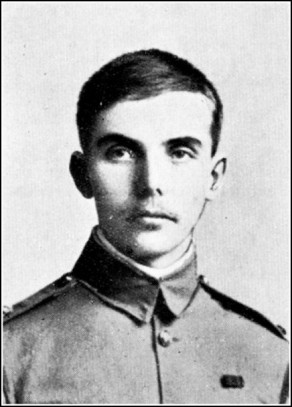
Captain Thomas Haworth PRESTON
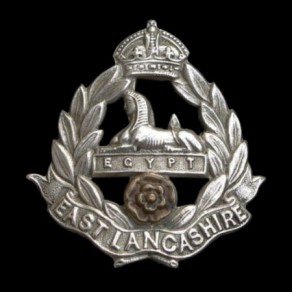
Regiment / Corps / Service Badge: East Lancashire Regiment

Divisional Sign / Service Insignia: 4th Division
Data from Soldiers Died in the Great War 1914 - 1919 Records
Soldiers Died Data for Soldier Records
Surname: PRESTON
Forename(s): Thomas Haworth
Born:
Residence:
Enlisted:
Number:
Rank: Capt
Regiment: East Lancashire Regiment
Battalion: 3rd Battalion
Decorations:
Died Date: 17/11/14
Died How: Killed in action
Theatre of War:
Notes:
Data from Commonwealth War Graves Commission Records
CWGC Data for Soldier Records
Surname: PRESTON
Forename(s): T H
Country of Service: United Kingdom
Service Number:
Rank: Captain
Regiment: East Lancashire Regiment
Unit: 1st Bn.
Age: 33
Awards:
Died Date: 17/11/1914
Additional Information: Son of John and Elizabeth Mary Preston, of Mearbeck, Long Preston, Yorks.
View Additional Text
View Additional Text For Soldier Records
England & Wales, National Probate Calendar (Index of Wills and Administrations), 1858-1966
1915
PRESTON Thomas Haworth of Mearbeck Settle Yorkshire died 17 November 1914 at Ploegsteert Flanders Probate London 17 September to Alison Mary Preston spinster. Effects £20499 15s. 5d.
THE BOND OF SACRIFICE. Vol. 1
CAPT. THOMAS HAWORTH PRESTON, 3rd BATTN. EAST LANCASHIRE REGIMENT (LIEUTENANT RESERVE OF OFFICERS), who was killed in action in Flanders on the 17th November, 1914, aged thirty-three, was the only surviving son of the late John Preston and Mrs. Preston, of Mearbeck, Long Preston, Yorkshire, his only brother – 2nd Lieutenant J. S. Preston, 1st Royal Scots – having died of enteric fever at Dewetsdorp, Orange River Colony, on the 27th June, 1900.
He was educated at Haileybury College, and was employed in the South African War with the Mounted Infantry, being present at operations in the Orange Free State, 1900; and in the Orange River Colony from November, 1900, to December, 1901. He was mentioned in despatches (“London Gazette,” 29th July, 1902), and received the Queen’s medal with three clasps. He joined the 2nd Battalion East Lancashire Regiment in 1902 in India, where he served between two and three years. After being invalided home he was transferred to the 1st Battalion, and was with them at the Curragh and Woking. He was promoted Lieutenant in November, 1904, and afterwards joined the Special Reserve.
He became Captain in the 3rd East Lancashire Regiment in November, 1911, and in 1914 was awarded the Royal Geographical Society’s diploma. He was a member of the Junior Army and Navy Club; was an excellent all-round sportsman; a splendid game shot, either with rifle of gun; a good fisherman; and a daring rider. He was unmarried.
Captain Preston went to France in August, 1914, in charge of the first draft to reinforce the 1st Battalion, East Lancashire Regiment, which he joined at Le Cateau, and fought with at the Marne and the Aisne. Captain Preston also took part in the severe fighting in Flanders round Ploegsteert, surviving many narrow escapes until the 17th November, when he was fatally hit by a piece of shrapnel.
HISTORY OF THE EAST LANCASHIRE REGIMENT IN THE GREAT WAR 1914-1918 (Littlebury Bros. Ltd. 1936)
1st Bn. East Lancashire Regiment
1914
On September 5th… the '1st reinforcement’ consisting of Captain Preston (S.R.) and 98 other ranks arrived. [This was the last day of the long ‘Retreat from Mons’]
The battalion was relieved by the 1st Hants on the night of the 17th/18th November, and moved to billets in Nieppe. The last action in Ploegsteert Wood – November 8th – November 17th – was the end of the Battle of Armentieres, and cost the battalion 45 killed and 126 wounded. The losses in officers during the whole period amounted to 8 killed and 7 wounded . . .
[Captain Thomas Haworth Preston was killed on the 17th November 1914.]
View Additional Image(s)
Additional Photo(s) For Soldier Records
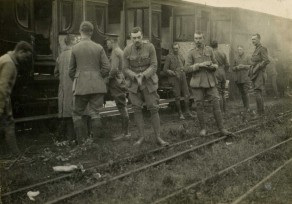
A meal break on the railway journey to the front in France
On extreme left: Captain Leeson, Captain Bellings (in Burberry), Captain Dowling (back to camera), Mr Belchie (Adjutant), Plum Warner (rubbing hands and facing camera), Captain Clay Mills (back to carriage door), Tom Preston (facing camera), Captain Goldie (back View), Captain Cane (facing), & Captain Dyer (hands in pockets)
View Craven Herald Articles
View Craven Herald Articles

30 October 1914
SETTLE
Thanks – The following note is from Captain Preston, of Mearbeck, Long Preston, the only man from the parish, probably, actually at the front:–
East Lancashires, 11th Infantry Brigade, British Expeditionary Force, October 17th.
“Dear Sir, – I should be much obliged if you would kindly insert in your columns this note of thanks to all those in and around Long Preston who have so kindly sent out so many, shirts and clothing for men in my Regiment, which will be much appreciated by them in the coming cold weather. I also send my best remembrances, should like to say I am fit and well, though we are having a fairly strenuous time at present. – Yours truly, T.H. PRESTON.”
27 November 1914
PRESTON – Killed in action in Flanders, on the l7th inst., aged 34, Captain T. H. Preston, Lancashire Regiment, only surviving son of the late John Preston and Mrs. Preston, Mearbeck, Long Preston.
27 November 1914
LONG PRESTON OFFICER'S DEATH
Captain T. H. Preston, East Lancashire Regiment, was killed in action in Flanders on the 17th inst. aged 34 years. He was the only surviving son of the late John Preston and Mrs. Preston, of Mearbeck, Long Preston. He served through the Boer War in South Africa, received the Queen's Medal with 3 clasps, and was mentioned in despatches. Last year he was awarded the Royal Geographical Society’s Diploma. His only brother, 2nd, Lieut. J. S. Preston, 1st Battalion Royal Scots, died in his country’s service at Dewetadorp during the South African War.
A memorial service was held in the Long Preston Parish Church on Sunday morning. Amongst a very large congregation were a cadet corps and soldiers in uniform.
The Rev. R. Shipman said that Thomas Howarth Preston was the first from that village to give his life for his country. He was in many ways a typical Yorkshireman, slow to reveal his character to a stranger, but when once he had given his friendship he revealed more and more the sterling qualities within. He had worked hard for the restoration of their church, journeying to Stamford to buy the oak, then seeing to its being sawn up, and stacked at Mearbeck. They would all sympathise with the widow who had lost the second and last of her soldier sons. She had week by week kept her anxious vigil whilst he had seemed to lead a charmed life is the battles of Mons and Aisne, until the end, in that ghastly slaughter of Flanders. In a previous battle he had had his field glasses smashed by a bullet!
The 'Dead March' from 'Saul' was played on the organ. The flag was at half-mast on the church tower.
The annexed telegram was received by Mrs. Preston, of Mearbeck, on Monday:–
Buckingham Palace, 12-5, 23rd Nov.,
Mrs. Preston, Mearbeck, Long Preston.
The King and Queen deeply regret the loss you and the Army have sustained by the death of your son in the serving of his country. Their Majesties truly sympathise with you in your sorrow.
PRIVATE SECRETARY
25 December 1914
LONG PRESTON – THE LATE CAPTAIN T. H. PRESTON
The lamented death of Captain T. H. Preston, of the East Lancashire Regiment, who was killed in action in Flanders on November 17th, was sincerely regretted by his many friends ………. and the deepest sympathy has been shown his family. He was the only surviving son of the late Mr. John Preston, and of Mrs. Preston, of Mearbeck, Long Preston, and served through the Boer War, receiving the Queen's Medal with three clasps, and being mentioned in despatches. His only brother, Lieutenant J. S. Preston, lst Battalion Royal Scots, died in his country's service at Dewetadorp during the South African War. --The following are extracts from letters sent to his mother by the late Captain Preston.
A 40-Miles March
September 25th
“We have been told that we can now mention in letters any place where we were at a week ago, so I will let you know as far as I can what has happened. It has all been practically stated in the English papers. I landed in the country with the first reinforcement one day after the battalion. The battalion went nearly to the Belgian frontier by train, to Cambrai, beyond St. Quentin, and there fought rearguard action near Ligny and most of the way back to within about 20 miles of Paris. You will have seen the list of officers who were wounded. They were Major Collins, D'Esterre, Seabrook, Chisholm, Salt, and Hooper. I went by train to Amiens to catch up with the battalion, and was then sent back to Rouen, and again to Le Mans, which is south of Paris. I then went back to Coulommiers, and from there we did a 40-mile march along the flank of the German Army and joined the regiment near Chevril which is about 20 miles east of Paris.
“From thence we followed the Germans, our artillery coming into action several times, to La Ferté; on the river Marne, where the enemy blew up the bridge over the river and left a rearguard to oppose us. We took a lot of prisoners there besides inflicting many casualties, but unfortunately our Colonel, Le Merchant, was shot from a house. Our loss there was comparatively trifling, though the Germans opened with four maxims from across the river. My company got some good long-range shooting at La Ferté, as the enemy had to retreat up a narrow road, and we nearly made them abandon a gun on the road. They had great difficulty in getting it away.
“About ten days ago we crossed the river Aisne at Boucy, about four miles from Soissons which the Germans shelled, and they broke up the houses full of civilians. Aeroplanes are much used by both sides to observe for the artillery and locate positions of troops and batteries. Of course they get shelled tremendously, and it is a pretty sight in mid-air, though they seldom get hit. I went on a river reconaissance the day before yesterday. I get a great deal of that sort of work on account of my having the Geographical Society's diploma. We have had nine days' heavy artillery fire round here.
“The above will give you a general idea of what has happened. I cannot give you details, as that would not be allowed by the Censor. I will tell you more later when it does not matter.”
Colonel Sniped
September 30th.
“You will gather more or less from the papers where I know am. I can tell you now fairly well what occurred two weeks ago when we crossed the river Aisne. We marched from La Ferté sous Jouarre on the Marne to the Aisne in two days. There was a picture in the 'Sphere' of September 12th of one of the bridges at La Ferté at which we had some fighting. I think l told you they opened on us with four machine guns there. My company afterwards caught them retiring up an enclosed road at long-range, and we gave them a bad time, but I regret to say they sniped our colonel Le Marchant. When at length we got into the town we found many dead Germans in the streets, and about 40 wounded in a hospital by the bridge close to the road up which we had caught them retiring. Our guns across the valley also accounted for several.
“It was very different at the Aisne, however. We crossed at Boucy, about four miles east of Soissons. The bridge over the river was partially blown up, so we had to go across man by man, on a girder. We crossed in the night fortunately. It was the worst night march I have ever had. We had been marching all day in the rain; and then stayed for two hours in a church at Citmont, about six or seven miles south of the Aisne, from 8 to10 p.m., and then started off in the dark ‘mid pouring rain and marched to the rivers, and crossed as I have described. Our brigade, the 11th Infantry, took up a position on the top edge of the high ground on the north side.
Like the Ribble Valley
“The Aisne is very like the Ribble Valley at Mearbeck in contour. As soon as it was light we became engaged all along the front by the German artillery, which is good. My company was on the outskirts of a wood and to the edge of the valley. An aeroplane came over. I kept quite still, as I thought it might not see us, but in five minutes we got a lot of shells among us. The first pitched a yard or two in front of me, and I got a smack on the back from a piece of earth or sod or something, and the next few hit nine of the men. We then moved a little to our flank, and got no more. They also shelled the remainder of our troops opposite the valley up from the river.
“We then entrenched ourselves on the edge of the valley all along the line, and our trenches, the villages, &c., have been bombarded for many days. The French were on our left at Soissons and Croucy, their Turcos and Zouaves being next to our brigade, which consists of East Lancashires, Hampshires, Somersets, and Rifles. The German position was about a mile and a half distant when we occupied the ridges.
“What we need as much as men is more guns, as the fighting chiefly resolves itself into an artillery duel. We had two batteries of field howitzers which took up a position near to a church at Boucy, but an aeroplane spotted them, and they were shelled out by some huge guns we imagined the Germans had brought up for the siege of Paris. Some of the shells were of 260lb. weight.
“Our aeroplanes have also done most excellent work. The Germans fairly hate them, as they discover the enemy's positions and spot for our artillery. Whenever our aeroplanes or French ones go near they get scores of shells, though they are rarely hit. I counted one which had nearly 200 shrapnel fired at it in about four minutes. The aviators are very good, and take little notice, but they cannot approach too close.
“All the windows in the church at Boucy are smashed, and the church itself badly damaged. I should like to know how many thousands of shells I have seen and heard fired here – a good many hundreds of thousand I think. In fact, there’s heavy cannonade going on whilst I write. Col. Seely, ex-War Minister, who has a billet on the Staff, came two days ago and took tea with us. About five minutes before he arrived at our mess dug-out, a shrapnel came partly through the roof, having burst just above, but no one was hit. The French officer in charge of the Turcos who have relieved the Zoaves, took tea with us. Colonel Lawrence who has been promoted colonel of our regiment arrived out to join us yesterday.”
24 December 1915
LONG PRESTON – IN MEMORY OF THE BRAVE
In the Parish Church on Sunday morning the service was in memory of Geoffrey Taylor, lst 6th Duke of Wellington’s, who was killed on 4th December. The Cadets were present. Lieuts. Ward and Sharples read the lessons. The Rev. R. Shipman said the village had been singularly fortunate; it was more than a year since the boys were there in uniform (after the death of Capt. Preston) and some time since they went to the Baptist Chapel to pay tribute to the memory of Harry Evans. There was no distinction between the Private who served faithfully and the Field Marshal. Geoffrey Taylor was an orphan, though indeed he had found a home and a new mother in the parish, and the lad’s life there on earth had been immeasurably gladdened in that Long Preston home. A year ago last November he spoke a few words particularly to the boys. There would come a time of trial in all their lives, and some of the older ones who were with them a year ago had gone to respond to the call of a noble patriotism. He hoped no more of them would have to go, but their comradeship and training would teach them to do things which were sometimes irksome, cheerfully, and be a great help to them in forming character. They need not think that the men in the trenches liked it; they could not like it; but they were there to see it through and to hang on until the work was thoroughly done.
28 July 1916
SETTLE – DEATH OF MRS. PRESTON OF MEARBECK
The death took place on Saturday of Mrs. Elizabeth Mary Preston, of Mearbeck, Settle, at the age of 66 years. During the latter part of her life she had much trouble, which greatly affected her health. Her eldest son, John Starkie Preston, died in the South African War from enteric fever, and her remaining son, Thomas H. Preston, who was a captain in the East Lancashire Regiment, was killed in the present War. She was of a gentle nature, and will be long remembered for her many kindly actions. She also took a general interest in the churches of the district. Much sympathy goes out to her daughter, Miss Preston, who is left to mourn her loss.
The funeral took place on Tuesday at the Parish Church, Giggleswick, where many people congregated. The service was taken by the vicar, the Rev. T.P. Brocklehurst. The coffin was of panelled oak, and the funeral arrangements were carried out by Messrs. Parker Bros., of Settle. There were no flowers by request.
04 July 1919
PEACE SUPPLEMENT TO THE 'CRAVEN HERALD' – CRAVEN'S FALLEN OFFICERS: CAPTAIN T. H. PRESTON
East Lancs. Regiment, son of the late John Preston and Mrs. Preston, Mearbeck, Long Preston. Killed in action in Flanders November 17th, 1914, aged 34 years.
View West Yorkshire Pioneer Articles
View West Yorkshire Pioneer Articles

27 November 1914
A LONG PRESTON OFFICER KILLED
Captain T.H. Preston, East Lancashire Regiment, was killed in action in Flanders on the 17th inst. He was 34 years of age, and was the only surviving son of the late John Preston and Mrs. Preston, of Mearbeck, Long Preston. He served through the Boer War, received the Queen’s medal with three clasps, and was mentioned in despatches. Last year he was awarded the Royal Geographical Society’s Diploma. His only brother, Second Lieut. J. S. Preston, lst Battalion Royal Scots, died in his country’s service at Dewetsorp during the South African War.
A memorial service was held in the Long Preston Parish Church last Sunday morning. Amongst a very large congregation were a cadet corps and soldiers in uniform. Rev. R. Shipman said that Thomas Howarth Preston was the first from the village to give his life for his country in this war. He was in many ways a typical Yorkshireman, slow to reveal his character to a stranger, but when once he had given his friendship he revealed more and more the sterling qualities within. He had worked hard for the restoration of the church, journeying to Stainforth to buy the oak, then seeing to it being sawn up, and stacked at Mearbeck. They would all sympathise with the widow, who had lost the second and last of her soldier sons. She had week by week kept her anxious vigil, whilst he had seemed to bear a charmed life in the battles of Mons and Aisne, until the end, in the ghastly slaughter in Flanders. In a previous battle he had had his field glasses smashed by a bullet. The Dead March from ‘Saul’ was played on the organ. The flag was at half-mast on the church tower.
A telegram was received by Mrs. Preston, of Mearbeck, on Monday, as follows:– “Buckingham Palace, 12-5, 23rd November, Mrs. Preston, Mearbeck, Long Preston. The King and Queen deeply regret the loss you and the army have sustained by the death of your son in the serving of his country. Their Majesties truly sympathise with you in your sorrow. Private Secretary.”
24 December 1915
CRAVEN’S ROLL OF HONOUR – LONG PRESTON
Capt. T.H. Preston, East Lancashire Regiment, aged 34 years, killed in action in Flanders on November 17th 1914. Only surviving son of the late Mr. John Preston, and of Mrs. Preston, Mearbeck, Long Preston. Received Queen’s Medal with three clasps and was mentioned in despatches for service in South Africa. Holder of the Royal Geographical Society’s diploma.
24 December 1915
LONG PRESTON – MEMORIAL SERVICE
n the Parish Church on Sunday morning, the service was in memory of Geoffrey Taylor, 1st 6th Duke of Wellington’s, who was killed on December 4th. The Cadets were present, and Lieuts. Ward and Sharples read the lessons. Corinthians xv. 24 ‘Then cometh the end’ was the text taken by Rev. R., Shipman, who said the village had been singularly fortunate. It was more than a year since the boys were there in uniform (after the death of Capt. Preston), and some time since they went to the Baptist Chapel to pay tribute to the memory of Harry Evans. There was no distinction between the private who served faithfully and the field marshal. Geoffrey Taylor was an orphan, though indeed he had found a home and a new mother in the parish, and the lad’s life there on earth had been immeasurably gladdened in that Long Preston home. There would come a time of trial in all their lives and some of the older ones who were with them a year ago had gone to respond to the call of a noble patriotism. He hoped no more of them would have to go, but their comradeship and training would teach them to do things which were sometimes irksome, cheerfully, and be a great help to them in forming character. They need not think that the men in the trenches liked it. They could not like it, but they were there to see it through, and to hang on until the work was thoroughly done. The hymns ‘O, God, our help in ages past’, and ‘A few more years shall roll’, were sung by the choir, and the ‘Dead March’ from ‘Saul’ played on the organ.
28 July 1916
PRESTON – July 22nd, at Mearbeck, Longpreston, Elizabeth Mary, widow of the late John Preston, of Mearbeck. Was interred at Giggleswick Church on Tuesday, the 25th.
[Mother of Captain Thomas Haworth Preston, killed in action, 17 November 1914.]
04 January 1918
SETTLE’S FALLEN HEROES
Memorial Service at the Parish Church
A memorial service for the Settle soldiers who have fallen in the war was held at the Parish Church last Sunday afternoon. There was a large congregation, and the service was conducted by Rev. W. E. Linney (vicar). The hymns ‘God of the living in Whose eyes,’ ‘Jesus lives,’ ‘On the resurrection morn,’ and ‘ O God our help in aged past’ were sung, and the ‘Last Post’ was sounded at the close of the service by two of the local Cadets. The organist (Mr. F. Lord) also played appropriate music as the congregation assembled and left the church.
The Vicar, in the course of his sermon, said they were met to remember the Settle soldiers, men, and boys – some indeed little more than boys – who had laid down their lives for the country at the war, whether during the year which was just drawing to a close or in the earlier stages of the conflict. When he asked them to remember those heroes that day, he knew that he was asking them to do what they were always doing. They were their own dear ones united to many of them by ties of blood – husbands, fathers, brothers, sons, as well as friends. How could they forget them? Were they not reminded of them day by day by the gaps in their home circles, which could never again be filled by them? They all desired in their hearts that God would bless and keep them, and give them peace. and happiness. The Vicar then read the following list of the Settle men who had laid down their lives:– John Edward Bell, Geo. S. Belles, Fredk. Baldwin, John Barrett, Robert Bateson, William Bradley, Frank Bulcock, George R. Bullock, Herbert Clark, John Cokell, Edward Ellershaw, Jas. Ewart, Wm. Ewart, Fredk. Frost, Harold Goss, Alfred Gower, Joseph Lord, John Morphet, John Packard, Chas. Peachey, Thomas Howarth Preston, Albert Ralph, Thos. Stackhouse, George Edward Turner, Derwent Turnbull, Wm. Troughton, Harry Walton, John Edward Wilson, Ernest Wooff, and Robert Wooff. Proceeding, the Vicar said they had a responsibility with regard to those men. They owed them a debt, and he trusted and believed that they were wishful to do all that they could to repay it. “ Our lives are being saved by their death. If we have any future before us on the earth it is because they gave up their futures to secure it. Their right to survive was as good as our own. Many of them would have been of far more use in the world than we can hope to be. The future stands to be only poorer for our surviving in their stead. We are debtors to them for all they have given us. To the future think of all it has lost in them.” How were they going to pay the debt, and in paying it to honour their heroic dead? Surely there could be but one answer – to live to give effect to their ideals. When they were asked what those ideals were, they might be well put in the words of Bishop Walshaw How’s hymn written for the diamond jubilee of Queen Victoria, “To make the world a better world for man’s brief earthly dwelling.” If Prussian militarism should gain the ascendancy the world would be scarcely a fit place to live in. What they wanted was the triumph of right and liberty. That was the task they had begun, and many of them, fired by the enthusiasm of a noble cause, literally went singing to their death. The old life which had no loftier aim than a high standard of material comfort had been felt to be unsatisfactory. To ardent youth the higher spirit of self-sacrifice, which was the spirit of Christ, beckoned onward with irresistible attractiveness, and they followed the gleam. They had yet to complete the great task to which they dedicated themselves. That was the way they could honour the memory of their fallen heroes, and with confidence that they had not died in vain.
A collection taken on behalf of the Red Cross Society realised £5 15s.
Comment on this Soldier Record
You can leave comments on this soldier record. Please note all comments will be manually approved before they appear on the website.

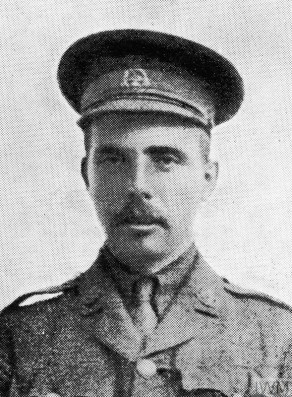
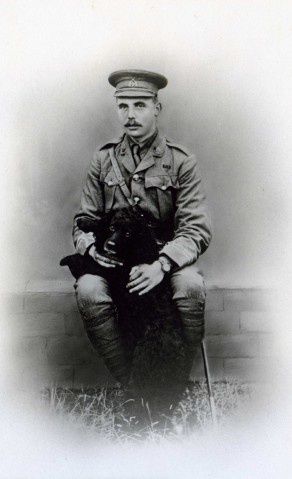
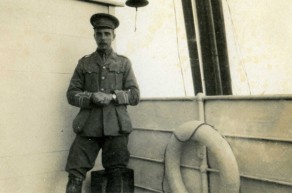
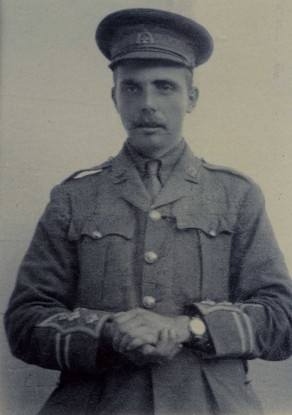
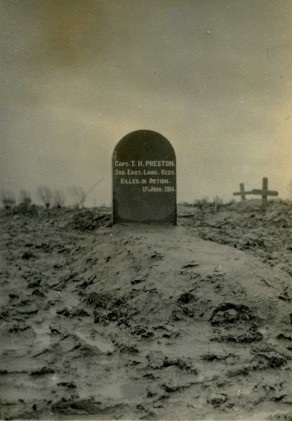
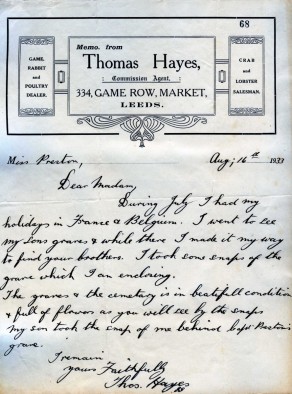
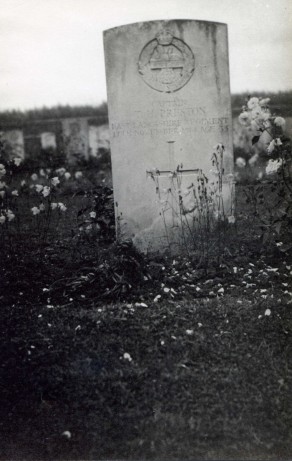
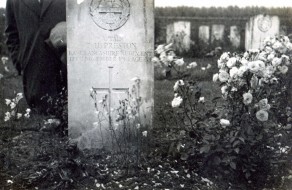
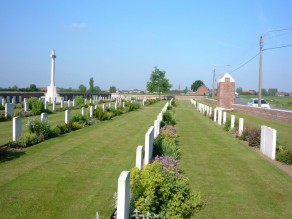



No comments yet.